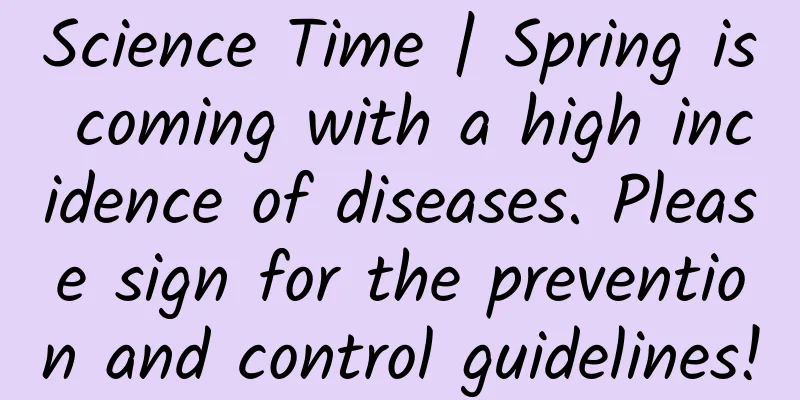Science Time | Spring is coming with a high incidence of diseases. Please sign for the prevention and control guidelines!

|
Spring is not only a time of revival, but also a time when various diseases are most likely to occur. Pink eye, allergic conjunctivitis, allergic rhinitis...are all affecting people's beautiful expectations for spring. Do you know how to understand and prevent them? Acute bacterial conjunctivitis Commonly known as pink eye, also known as "acute catarrhal conjunctivitis", it is an eye disease caused by bacterial infection. Its main symptoms include redness, pain, itching, increased secretions, etc., which may lead to decreased vision in severe cases. Pink eye develops rapidly and is highly contagious. It is more common in spring and autumn and can spread the infection. It is usually transmitted through contact, such as through hands, towels, face wash utensils and other items. This is how to prevent: 1. Pay strict attention to personal and collective hygiene. Encourage frequent hand washing and avoid wiping eyes with hands or sleeves. 2. Patients in the acute stage need to be isolated to avoid infection and prevent epidemics. When one eye is sick, prevent the other eye from being infected. 3. Strictly disinfect the face washing utensils, towels and medical instruments that have been in contact with the patient. In short, conjunctivitis is a common eye disease. Although it is contagious, its spread and harm can be effectively controlled as long as we pay attention to prevention and treatment. Seasonal allergic conjunctivitis Seasonal allergic conjunctivitis, also known as hay fever conjunctivitis, is the most common type of ocular allergic disease, and its allergens are mainly plant pollens. The main characteristics of the disease are seasonal attacks (mostly in spring and autumn); usually both eyes are affected, the onset is rapid, and the symptoms are relieved or disappear quickly after the allergen is removed. The most common symptom is itchy eyes, which can occur in almost all patients, with varying degrees of severity. There may also be manifestations such as foreign body sensation, burning sensation, tearing, photophobia and mucous secretions, and the symptoms are aggravated in high temperature environments. This is how to prevent: 1. Avoid contact with allergens: The main allergens of seasonal allergic conjunctivitis are pollen, dust mites, animal hair, etc. Therefore, before the onset of the season, you should try to avoid contact with these allergens, such as reducing the time of outdoor activities, avoiding places with a lot of pollen, and keeping the indoor air clean. 2. Pay attention to eye hygiene: keep your eyes clean and avoid rubbing your eyes. 3. Enhance immunity: Maintaining a good schedule and eating habits, exercising properly, and improving immunity will help reduce the occurrence of allergic reactions. 4. Eye protection: When engaging in outdoor activities, you can use goggles or wear a mask to reduce eye irritation from allergens such as dust and pollen. 5. Seek medical attention promptly: If symptoms persist or worsen, it is recommended to seek medical attention promptly so that the doctor can diagnose and treat according to the specific situation. In short, allergic conjunctivitis is a common eye disease, and patients should seek medical attention promptly and follow the doctor's advice for treatment. By avoiding allergens and actively treating them, the symptoms can be significantly improved, but it is difficult to cure and often recurs. Allergic rhinitis Allergic rhinitis is an allergic reaction that occurs in the nasal mucosa and is also a common manifestation of respiratory allergy. It sometimes coexists with bronchial asthma and some patients with seasonal allergic conjunctivitis also have it. Its incidence has increased significantly in the past 20 years. The age of onset is mainly young and middle-aged people, but now children are also more common. Symptoms of allergic rhinitis include nasal congestion, runny nose, nasal itching, throat discomfort, and cough. In addition, patients may also experience sneezing (usually sudden and violent), nasal congestion, stuffy ears, decreased sense of smell, dizziness, and headaches. Children may develop allergic signs due to rubbing their noses. Some patients may also experience itchy and red eyes. The causes of allergic rhinitis are diverse, including inhaled allergens (such as indoor and outdoor dust, dust mites, fungi, animal fur, feathers, cotton wool and plant pollen), food allergens (such as fish, shrimp, eggs, milk, flour, peanuts, soybeans, etc.), contact objects (such as cosmetics, gasoline, paint, alcohol, etc.) and physical factors (such as changes in temperature, temperature fluctuations, etc.). This is how to prevent: 1. Avoid contact with allergens: Patients with allergic rhinitis are generally allergic to certain substances, such as pollen, dust mites, animal fur, etc. Understanding and avoiding contact with these allergens, and wearing a mask or nasal air filter when going out can significantly reduce the onset of allergic rhinitis. 2. Keep the room clean: Clean the room regularly, keep the room dry, and avoid humid environments to reduce the breeding of dust mites. In winter, you can place a humidifier to maintain indoor humidity and prevent the air from being too dry. 3. Strengthen your physical fitness: Appropriate exercise can help enhance your body's immunity and reduce the onset of allergic rhinitis. You can try some aerobic exercise, such as jogging, swimming, etc. 4. Pay attention to diet: Patients with allergic rhinitis should maintain a light diet and avoid eating too greasy, spicy, and irritating foods, such as peppers, hot pot, etc. At the same time, they should eat more foods rich in vitamins, such as fresh fruits and vegetables. 5. Maintain good living habits: avoid staying up late, smoking, drinking and other bad habits. These habits may reduce the body's immunity and increase the risk of allergic rhinitis. |
<<: Can eating tomatoes whiten your skin? I'm just overthinking it, but...
Recommend
Can I eat cold food during early pregnancy?
Pregnant women in the early stages of pregnancy s...
Reasons for scanty menstruation
For women, menstruation every month is a sign of ...
How to cure Candida albicans
Candida albicans is not unfamiliar to women, beca...
What are the benefits of eating peas for women
Lentils are a common vegetable in daily life and ...
How long does it usually take for menstruation to occur after taking birth control pills?
Everyone knows that many people nowadays suffer f...
Ovarian cyst 6cm becomes smaller after menstruation
The uterus and ovaries are a very important part ...
How to regulate irregular menstruation for women
Irregular menstruation is a very common physiolog...
Can I eat oregano during my period?
As we all know, menstruation can be said to be a ...
Early symptoms of ectopic pregnancy
Every woman is afraid of ectopic pregnancy. For w...
How to use pressed powder
For girls who like to wear makeup, powder is an i...
Parents, please stop taking it lightly! High myopia can cause health risks to children
The myopia rate among primary and secondary schoo...
Frequent false labor led to the birth of a child with cerebral palsy
False labor will occur after pregnancy. Under nor...
My belly is itchy as my due date is approaching.
In life, many women will feel that their belly is...
Still bleeding one month after giving birth
After ten months of pregnancy, the next most pain...
Why is it easier to have a baby while lying on your back?
Women in early pregnancy need to pay special atte...









